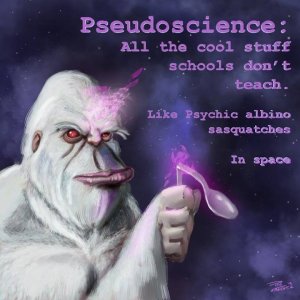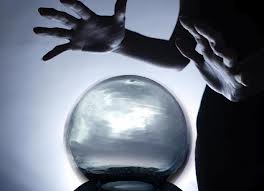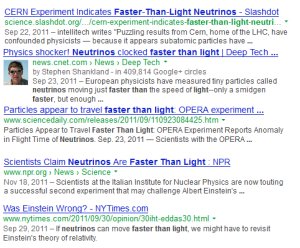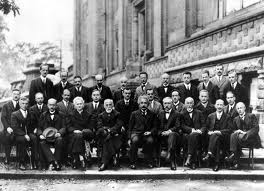

Anecdotal evidence throughout most of human history has “proven” the existence of the paranormal and supernatural. From eyewitness testimony of the power of psychics, to stupefying magicians, to bigfoot/the Loch Ness monster/aliens/ghosts: human history is ripe with fantastic stories of the “unexplainable”. Why hasn’t science proven the existence of these phenomena? Are scientists blinded by their antiquated scientific theories, refusing to accept the supernaturally rife reality we live in?
One of the primary arguments against any new idea that is opposed by the scientific community at large is simply “accepting this new idea would change/challenge/disrupt the worldview held by the scientists in question”. Is there any truth to that type of statement? We are all human after all (at least, as far as I know), scientists can devote large portions of their lives to the pursuit of a particular idea or theory. In addition, this opens up two other points beyond the paranormal – the acceptance of alternate theories (say, Modified Newtonian Dynamics over dark matter) and the funding of scientific research (should we continue to research alternative medicines that haven’t been shown to work in ‘traditional’ settings).

To analyze this question, we need to look at the scientific community’s response to extraordinary claims. A fantastic example of this can be found from a study that was published by Daryl J. Bem, a Cornell professor, claiming to have found evidence for the existence of psychic powers. Bem wasn’t thrown out of the scientific club, his research wasn’t blocked by the scientific community (I’ll reiterate, his study was published in a scientific journal). Instead, his claims were taken seriously and other research teams sought to reproduce his results. Having tests that are repeatable is the most important aspect of the scientific method. For any claim to be validated, it needs to make a testable prediction and that testable prediction needs to be repeatable under scientific conditions. If other researchers cannot repeat the results of the original study using the same methodology, it means something was wrong with the original study.
Long story short, the other research teams did not get the same results Bem’s original study yielded and psychic powers escaped scientific validation yet again. Psychic advocates were quick to assert the study was ‘disproven’ by scientists who were purposely setting out to discredit claims of psychic powers. The only problem is Bem himself congratulated the other research teams and stated they had “made a competent, good-faith effort to replicate the results of one of my experiments on precognition” and continued to say that he had jumped to conclusions too quickly.

In the realm of science, let’s consider the faster than light neutrino. Allow me to set the stage for you. It was September 23, 2011 when the world woke up to impossible news: scientists have measured neutrinos traveling faster than the speed of light. Headlines around the world read ‘Was Einstein Wrong?’, ‘Faster than Light Neutrinos Could Disprove Relativity’, ‘Physicists Worried about Relativity’ and the like. All of a sudden, it appeared as if a century’s worth of physics and scientific advancements began crumbling all around us. Most of these stories (and the first one I read) left you under the impression that this result was all but certain, what they didn’t say is that this result was a one-time occurrence and it hadn’t been confirmed.
Most of the scientific community at large attempted to quell the journalistic firestorm from this “finding” saying things like “the correct attitude is to ask oneself what went wrong? My gut reaction is that this is a false alarm.” Relativity is one of the cornerstones of modern science, so disproving it would be a VERY big deal. The scientific community started to analyze the experiment to determine whether it was, indeed, valid. In the end, they discovered the relativity defying neutrinos were the result of some simple measurement errors – very boring.

Scientists are explorers of the natural world. The peer review process is an excellent defense against human biases. In science, there are basically two ways to make a name for yourself. You either prove somebody wrong or you discover something new. Einstein will always be remembered for discovering relativity. Copernicus, Kepler, and Galileo will always be remembered for advancements in heliocentrism (among other things). If I conclusively and definitively disproved evolution tomorrow, I would go down in scientific history and would be a shoe-in for a Nobel Prize.
Why hasn’t science proven the existence of the paranormal? Simply because there is little to no supporting evidence for its existence. If massaging your aura was a way to cure disease, the medical community would be all over it. If psychics could accurately predict the future, talk to the dead, or see far away things, the military, law enforcement, and search and rescue would employ these gifted people like there was no tomorrow.

From a financial standpoint, there is only so much money and a wide variety of scientific problems to tackle. When a scientific idea, no matter how “supernatural”, has some credence, resources are devoted to its study. Thus far, the supernatural hasn’t been proven and it isn’t a strong area of active study because of a lack of supporting evidence (though, study is still conducted in different supernatural fields). Why is this? Not because scientists refuse to look at the evidence, but because the evidence simply isn’t there.